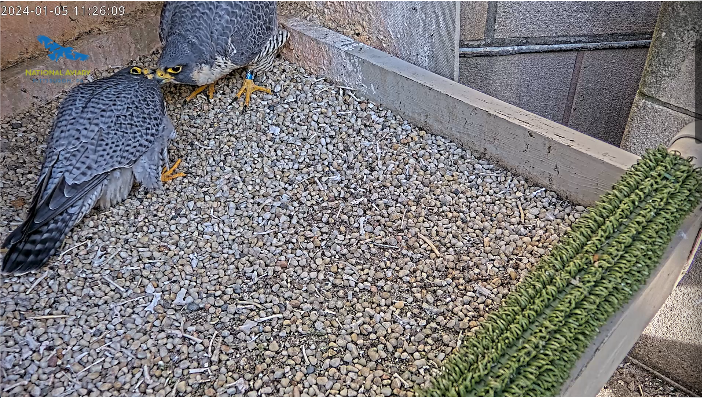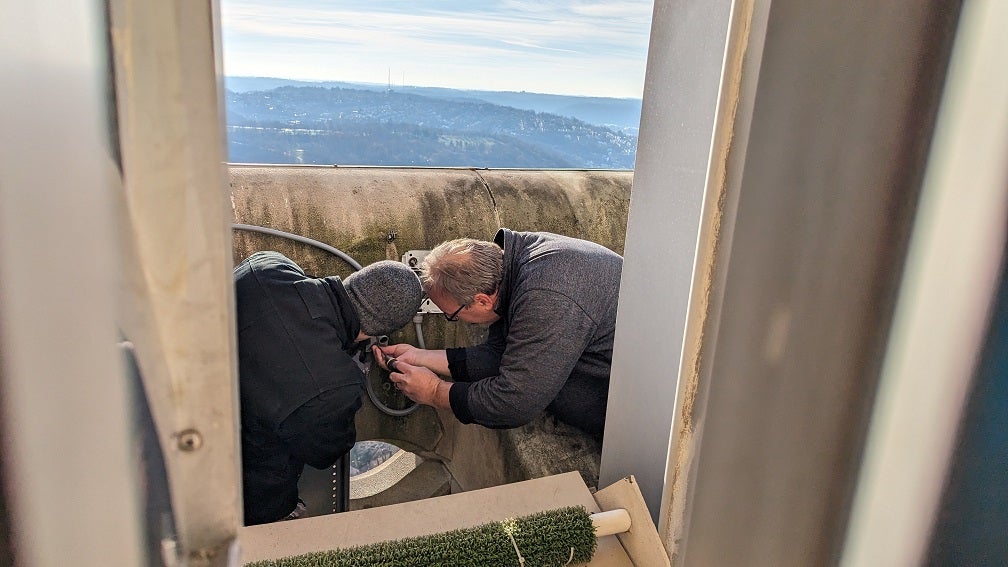You are here
Livestreaming the Peregrine Falcon Love Story on Cathy

The National Aviary's live stream of the Peregrine Falcons residing at the Cathedral of Learning on the University of Pittsburgh campus in Oakland is officially back for another nesting season. The 2024 season has two exciting additions: a new falcon pairing and a brand-new camera and microphone, with installation spearheaded by the University of Pittsburgh’s Information Technology department (Pitt IT), for the optimal viewing experience. The public can watch along at aviary.org as new female Carla and her mate Ecco develop their relationship and potentially lay eggs. They can also read weekly updates on aviary.org from the National Aviary’s ornithologist, Robert Mulvihill.
Ecco’s former partner, female Morela, was last seen on camera during May of 2023. Following her departure, a new banded female officially arrived at the Cathedral of Learning falcon nest and was identified as “Carla.” Carla and Ecco have demonstrated courting behaviors at the nest over the last several months. Viewers can expect to see the breeding pair continue to acclimate to one another through vocalization and postural changes.

“The National Aviary’s live-streaming camera transports viewers into the fascinating world of wild Peregrine Falcons,” says Robert Mulvihill, Ornithologist with the National Aviary. “It is our hope that providing the public with access to witness something so remarkable will not only increase their interest in birds, but also how they can support the work we do to protect species and their natural habitats.”
In September of last year, the Aviary’s former nest camera stopped working. With the help and financial support of the University of Pittsburgh’s Dietrich School of Arts & Sciences, Pitt IT, and Pitt IT’s vendor partner, Lighthouse Electric, the old camera was taken down and replaced with updated equipment. Viewers will notice a sharper focus, extended reach, improved audio, and an infrared light for better visibility in low-light conditions. Funding for the new camera was contributed by the National Aviary and by Aviary supporter Kate St. John, writer of the popular nature blog, “Outside My Window.” The Presenting Sponsor of the 2024 Peregrine Falcon Nest Cam season will once again be The Birdwatchers Store in Slippery Rock, Pa.

“Pitt IT is incredibly excited to continue our partnership with the Aviary so that viewers can witness the falcon season even more clearly thanks to the amazing upgrades this new equipment provides,” says Kim Getz, customer success manager for Pitt IT. “The new camera really puts you in the heart of the action happening in the nest box. The Cathedral of Learning is such an important historical building that the installation process was a delicate matter. Thankfully, our team was up to the challenge of replacing outdoor equipment over 40 stories high!”

Peregrine Falcons were formerly endangered in Pennsylvania, due to the use of DDT, an agricultural pesticide, leading to rapid declines in their population. With careful conservation action, Pennsylvania’s Peregrine Falcons increased in number and eventually began nesting on the natural cliff sites they had historically used, in addition to manmade structures like bridges and skyscrapers. Currently, Peregrine Falcons are no longer threatened but continue to need the public’s support. For more information on Peregrine Falcons and the National Aviary’s livestream visit aviary.org.
About the National Aviary
The one and only National Aviary is located on Pittsburgh’s historic Northside since its founding in 1952. The National Aviary is home to more than 500 birds representing more than 150 diverse species from around the world, many of them threatened or endangered in the wild. The National Aviary’s large walk-through habitats create an intimate, up-close interaction between visitors and free-flying birds, including opportunities to hand-feed and to meet many species rarely found in zoos.